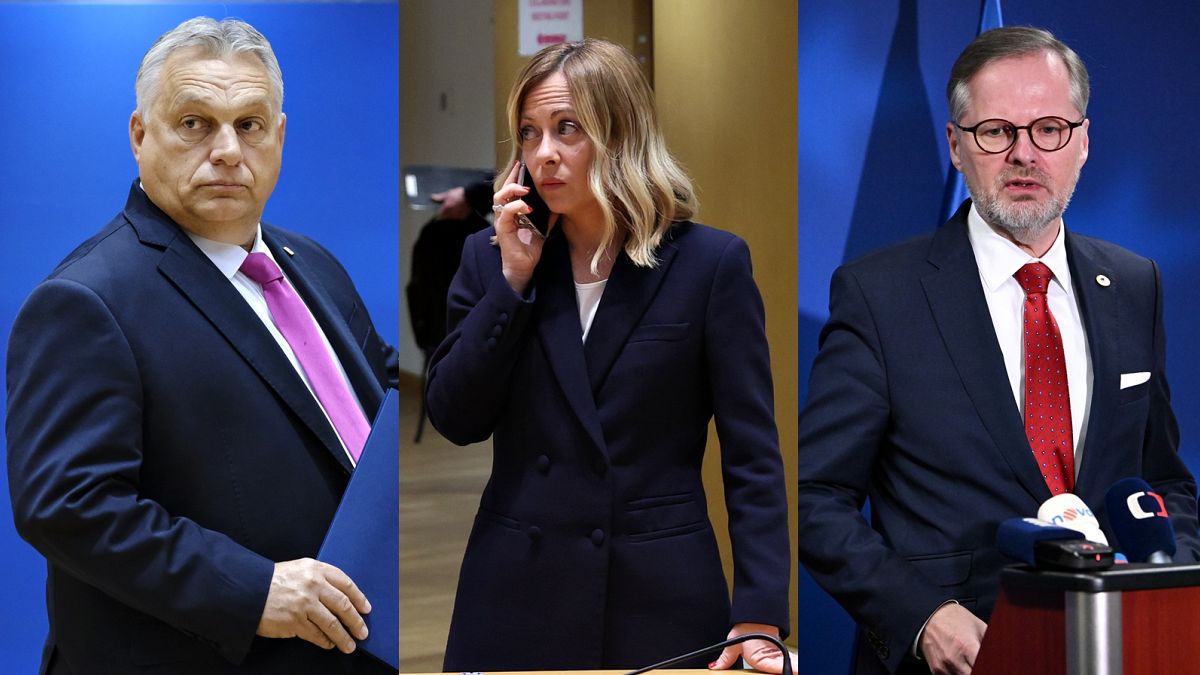Viktor Orbán, Giorgia Meloni and Petr Fiala want to have a greater say on how the EU top jobs are allocated. But the numbers play against them.
Who should lead the European Union in the next five years? Ten days after the elections, the question remains unanswered.
An informal summit on Monday failed to deliver the necessary breakthrough, despite a settled trio of frontrunners for the top jobs: Ursula von der Leyen for the presidency of the European Commission, António Costa for the presidency of the European Council and Kaja Kallas for the High Representative for Foreign Affairs and Security Policy.
On paper, the selection ticks all the boxes: politically diverse, geographically mixed and gender balanced. It is also a roster of well-known faces who have rubbed shoulders with leaders for the past five years and are unlikely to pull any major surprises.
Still, there was no deal. A raft of bilateral and trilateral meetings between the three main parties – the European People’s Party (EPP), the Socialists and the Liberals – helped bridge the gaps but became bogged down by the EPP’s maximalist demands.
A summit is pencilled for 27 June to make a new attempt.
In the meantime, recriminations have begun. A handful of leaders have aired their displeasure and frustration with how negotiations are being conducted.
“The will of the European people was ignored today in Brussels,” Hungary’s Prime Minister Viktor Orbán said at the end of Monday’s meeting.
Orbán attacked the EPP, which comfortably won the elections, for splitting up the top jobs with the Socialists and the Liberals, which came in second and third, respectively.
“They don’t care about reality,” Orbán wrote. “We shouldn’t be naive: they will continue to support migration and send even more money and weapons to the Russia-Ukraine war.”
A day later, Il Corriere Della Sera published an article detailing the anger of another leader: Italy’s Giorgia Meloni. According to the newspaper, the premier, who has positioned herself as a kingmaker, resented being left on the sidelines while bilaterals were ongoing and refused to accept a “pre-packaged” selection without having first a “serious and in-depth” discussion about the elections.
Then, a third signatory jumped in the fray to air his grievances: Czechia’s Petr Fiala, who made a far-fetched link between his country’s geography and its claim to power.
“The rules are clear, nominations for the top jobs in European institutions must respect political and geographical interests,” Fiala wrote on social media. “The Czech Republic is at the centre of Europe – our future portfolio must reflect this.”
On the sidelines
The grievances voiced by Orbán, Meloni and Fiala stem from one common trait that unites them: none of them belongs to the three pro-European families – the EPP, the Socialists and the Liberals – that have for decades dominated Brussels.
Although this influence is no longer what it used to be, the “grand coalition” still holds a ruling majority in the European Parliament and controls the European Council, with about 75% of heads of state and government around the table.
In their view, these numbers are strong enough to maintain the traditional game of horse trading that dictates the top jobs are allocated to the EPP, the Socialists and the Liberals according to their electoral performance. While this way of working has been criticised as “backroom deals” bereft of transparency, it has ensured stability and predictability in the bloc’s policy-making cycle.
But for Orbán, Meloni and Fiala, the winds of change are blowing.
The increase in support for hard- and far-right parties in the June elections is, for them, the dawn of a wider overhaul of the EU’s long-standing norms, starting with the distribution of top jobs. Their bolstered voices should be heard and acknowledged with greater authority, their thinking goes.
“The result of the European election is clear: right-wing parties got stronger, the Left and the Liberals lost ground,” Orbán said. “We will not give in to this! We will unite the forces of the European right and fight against pro-migration and pro-war bureaucrats.”
The arithmetic, though, paints quite a different picture.
Although nationalists made inroads, they fell short of the “massive wave” or “surge” that opinion polls had anticipated. In the next legislature, they will be larger but remain a minority. The “grand coalition” will command a 400-plus seat majority – out of 720 seats – that could swell past 450 with the addition of the Greens, enough to steady the boat.
By contrast, the hard-right European Conservatives and Reformists (ECR) group and the far-right Identity and Democracy (ID) group will have over 130 seats together, which might expand if some non-attached members join their ranks.
In the European Council, where political decisions are made at the highest level, the numbers are starker: the ECR has two representatives – Meloni and Fiala – and the ID has none. Orbán is not affiliated and has set his sights on the ECR group. His candidacy, however, is resisted by the group’s pro-Ukraine members, including Fiala’s party.
Mindful of their fragmentation, ID figures have promoted talks to form a radical-right super-group to amplify their clout. But the effort has so far been unsuccessful and faces ideological disagreements between the forces, particularly on Russia and China.
Even if that super-group were to emerge and surpass the Socialists as the Parliament’s second-largest formation, it would not alter the results of the elections. The balance of power in the Parliament and the Council would be the same, with the centre commending enough votes to guarantee that the top jobs are placed in the hands of those who want to strengthen, rather than weaken, the project of European integration.

